How well is the UK economy doing? A rare example of a constructive and informative debate on Twitter
Anorak post warning - this is going to be a very long post with a lot of reference to statistics and the details of Brexit.
At some stage I must write a book on how easy it is to make true but misleading statements promoting a pre-judged narrative yet based on accurate statistics. It would also cover what you need to look for to get to the truth (not that hard if you know what you are looking for) and, rather harder, how to tell the story if you want to show the accurate picture.
Though if you want to read a classic book on the subject it is still hard to beat a golden oldie,
"How to lie with statistics" by Darrell Huff,
a book which is significantly older than I am, but which has rarely been equaled and never surpassed. It is still available on Amazon.
There was always a lot of this between left and right, but a UK national conversation full of utterly misleading nonsense from all sides reached it's absolute nadir from both "Leave" and "Remain" campaigns during the EU membership referendum.
I was driven to write a whole series of posts called "The worst of both worlds" calling out the absolute nonsense which far, far too many people on both the Leave and Remain campaigns were putting out. There is a set of links to all of them on a post called
"The nonsense from both sides continues even after the EU referendum (chris4copeland.blogspot.com)"
which you can jump to by clicking on the title above of that post.
To give complete transparency about where I am coming from, after a lot of careful thought I voted Remain in 2016, and if I was somehow transported back to referendum day knowing everything that I know now I would most certainly do so again, but I believe in democracy, and ignoring the decision of the British people in that referendum to vote to leave would have done far more damage to Britain that Brexit itself ever has.
And I am absolutely fed up with hardliners on both sides who continue to talk rubbish about Brexit eight years after the vote, sometimes in an attempt to justify positions they took years ago which were quite clearly wrong, more often asserting benefits or costs which we will never be able to prove either way.
We will never know what would have happened if the vote had gone the other way, or if a different version of Brexit had been pursued - though the leaders of the Leave campaign have nobody but themselves to blame if they don't like the sort of Brexit we had, because they refused to specify what sort of Brexit they wanted before the referendum so as to make it harder for the Remain campaign to pick holes in it.
And between the pandemic recession, the bounce-back from the pandemic recession, Putin's war in Ukraine, and a whole host of other events which have since evented, both Leave and Remain can produce all sorts of statistical excuses why almost any given item of data about how well or badly Britain is going was or was not linked to our departure from the EU.
Any honest and unbiased economist will tell you that Britain is doing vastly better than was suggested by the worst case projections from the remain side, and much less well than the best case projections from Leave.
One of the ironies of the situation is that when I write things like this I am much more likely to be attacked by people who voted the same way as I did - e.g. hardline Remain supporters - than by people who voted the other way. I have had my share of attacks from hardline Brexiteers but not as many and ironically they are often a lot less rude than the Remainers.
There are few things more infuriating than being called a liar when you are telling the truth, and I've had that from fellow Remain voters far more often than from people who voted for Brexit.
The thing is that people can genuinely disagree. But often when people accuse someone else of deception, the accusation is based on misunderstanding rather than because either side is lying.
However, I want to refer today to an example of a GOOD debate, where it is quite clear to me that both participants are offering their honest opinions, have shown their working and sources, and I was left better informed from having read both sides. However, I am quite clear that one of these contributors has a much stronger case than the other. I am going to give both in full, so this post will get even longer!
It started with a tweet from the treasury:
HM Treasury on X: "The UK is on the up & since 2010 has grown faster than any other major European economy. https://t.co/L0xxKUBVBB" / X (twitter.com) which claimed that:
Self-appointed fact checker and author of "Slaying Brexit unicorns" Edwin Hayward attempted to debunk this tweet, and wrote as follows.
"There's a big problem with this bold HM Treasury claim, even though it's being bandied about by Brexiters like a winning lottery ticket.
It's true, but only in a narrow and misleading way.
Deep breath. Here's why...
(Long tweet. Please expand to see the whole thing.)
If you dig into the underlying OECD data, it appears that by one very carefully chosen measure, UK GDP really did grow the most since 2010 of all the countries the Treasury team decided to compare us with.
But there's a dirty statistical trick at play.
You see, they did not account for population growth (table below).
I went back to the OECD data and did my own number crunching to try to unpick what's going on.
(You'll see that the figures in the Treasury's graph differ from those below because they looked at aggregate % changes in GDP, while I used the underlying GDP figures. But the exact same principle applies to both.)
Here's the UK, ahead of the pack...
Now watch what happens when we adjust for population growth...
Suddenly, the UK's no longer in pole position. Instead, Germany is.
That's right. Germany. The country that Brexiters seem to spend most of their time mocking because of its supposed low growth rate.
Perhaps it's easier to see the extent of the Treasury's fiddle factor on a bar chart.
The blue columns show unadjusted GDP growth rates (i.e. what the Treasury used).
The red columns show GDP growth rates adjusted for population changes.
CONCLUSIONS
1. The UK is second in GDP growth, not first
2. We're still ahead of France, Spain and Italy, but by much less than the Treasury's own figures suggest
3. Italy comes out looking healthier, because its GDP grew despite a declining population.
So there you have it. Next time a Brexiter waves the Treasury graph at you, explain to them as politely as possible (rudeness blunts the message) why it is not accurately representative of reality."
He goes on to link to his sources for the OECD data, which you can find by going to his tweet at
---------------
Now, offhand, looking at his own graph, I don't think the UK would be doing that badly even if Edwin was right!
But I don't think he is. Note by the way, that he was not saying that the Treasury statement was untrue, only that it is misleading. But even if you think it is better to use GDP per head for comparison than total GDP growth, the UK still comes out second out of five large European economies, ahead of France, Spain or Italy, on his own figures.
However, I want to refer to a reply by independent economist Julian Jessup who is an IEA economics fellow.
This was Julian's reply:
"A good effort - and I appreciate you've shown your workings - but your numbers are still wrong... 🤓
- The Treasury chart shows the change between Q4 2009 and Q3 2023 (i.e. quarterly data – see the footnote). You have compared 2022 with 2010 (annual data). That is why the numbers in the Treasury's graph differ from yours, not because you’ve used the ‘underlying GDP figures’ (whatever that means).
- Even on your terms, your numbers are incorrect. You cannot calculate the per capita growth rate between two periods simply by subtracting population growth from the growth of total GDP. That’s just bad maths. Instead, you need to calculate GDP per capita in each period, then compare these two numbers.
- You could have avoided this error by using the GDP per capita data that the OECD already publishes (just type ‘quarterly GDP per capita’ into the data explorer below), rather than trying to create your own. https://data-explorer.oecd.org
My table below shows the correct numbers for the annual comparison (these are US dollars per person, PPP converted, 2015 prices)...
At least you're right that the UK was 'only' the second best performing of the large European economies on per capita growth over this period (still worth shouting about). However, the gap with Germany between 2010 and 2022 was much smaller than your incorrect numbers implied.
What's more, we already have preliminary German data for 2023, which show that Germany's per capita GDP contracted sharply (by 1.2%) last year - much worse than is likely in the UK.
We don’t yet have the UK data, but it wouldn’t surprise me if the UK outpaced Germany too on the per capita measure between 2010 and 2023.
I will of course update this when the UK data come out (15 Feb). Will you do the same? 😉
I shall look out for what they both have to say on 15th February with interest!
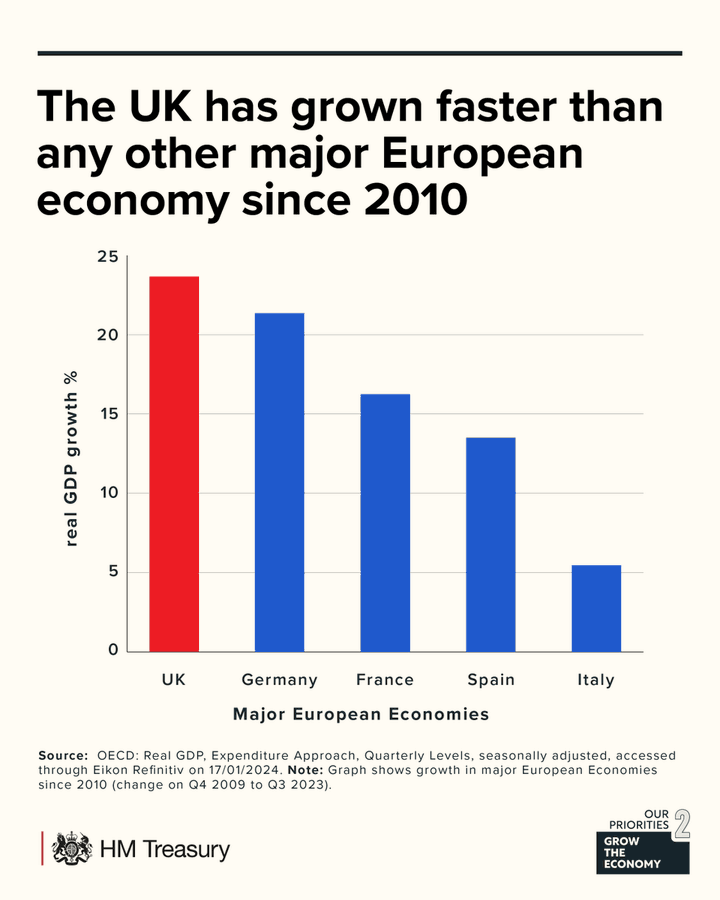
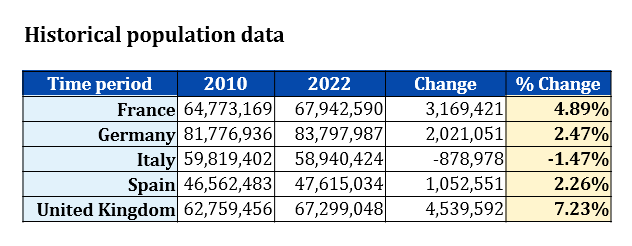
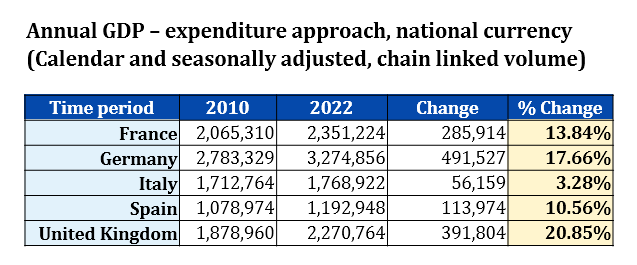
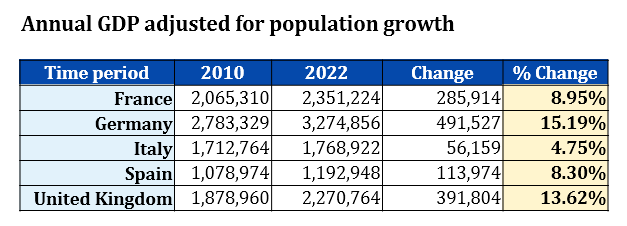
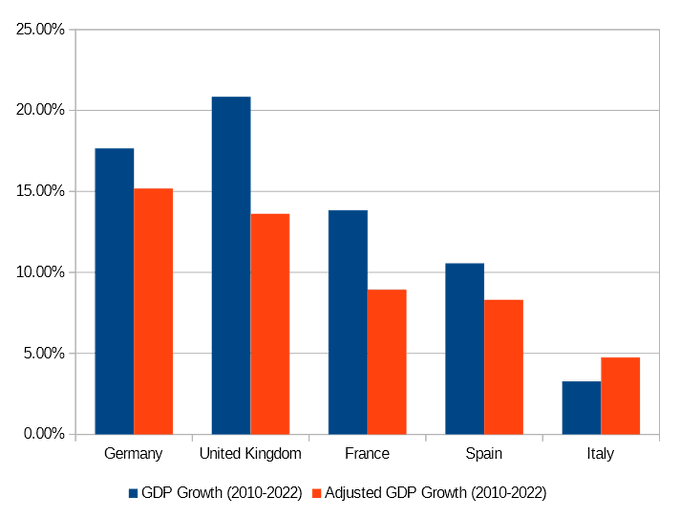

Comments